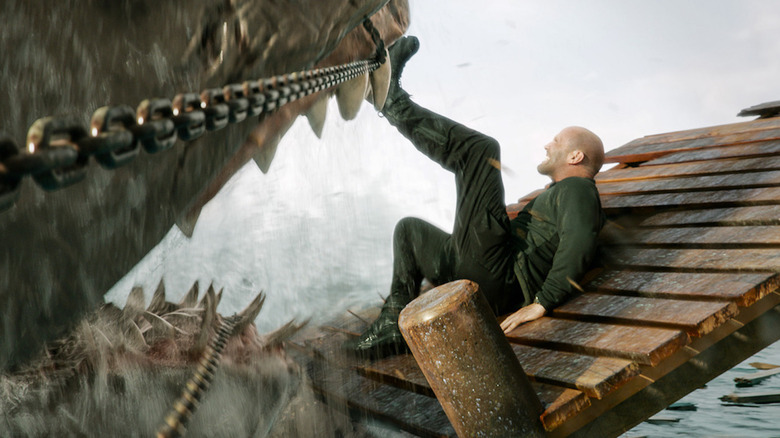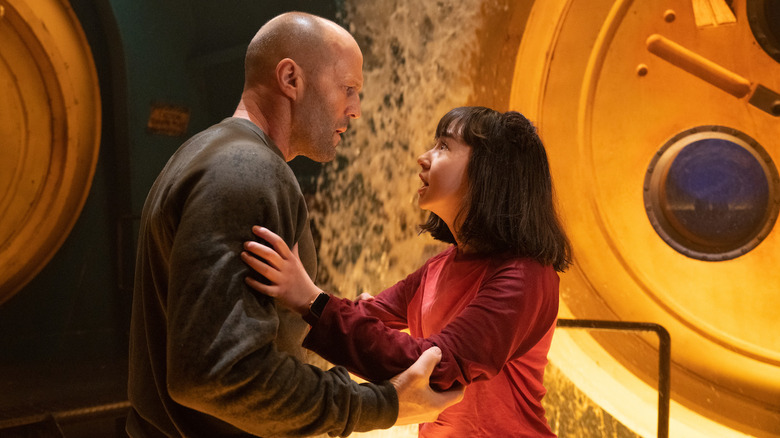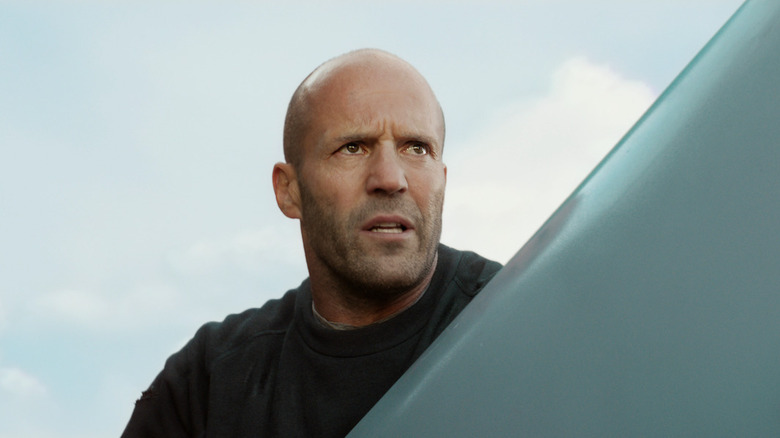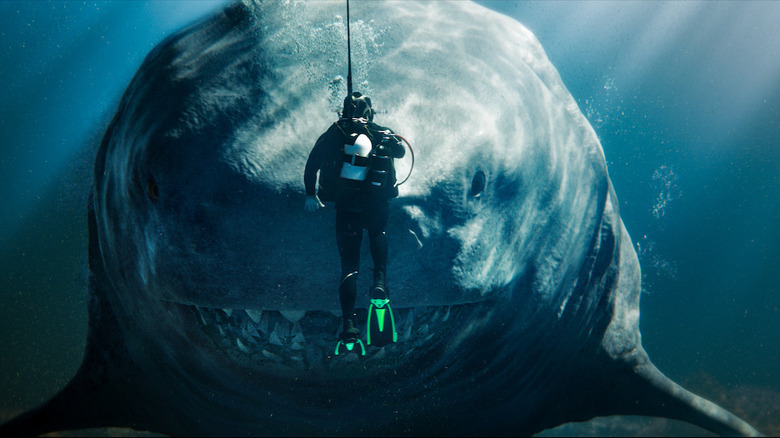Meg 2: The Trench Director Ben Wheatley Just Wants You To Enjoy The Monster Mayhem [Exclusive Interview]
Of course Ben Wheatley had a monster movie in him.
Before he directed "Meg 2: The Trench," Jason Statham's second "giant prehistoric shark threatens the world" outing, Wheatley proved himself capable of floating between genres with a remarkable ease. Nasty, head-splitting horror movies like "Kill List." Pitch-black comedies like "Sightseers." Impossible literary adaptations like "High-Rise." Slick streaming remakes like "Rebecca." And then there are his memorable episodes of "Doctor Who." It was only a matter of time before he made a massive studio-funded B-movie (a term used here with love) where one of the great modern action heroes goes mano-a-sharko with a beast big enough to devour a boat in a single bite. To call this the natural evolution of one of the most interesting modern filmographies would be an understatement.
I sat down with Wheatley over Zoom ahead of the film's release. Naturally, we talked about monster movies, and how he was fully prepared to work on a big studio movie like "Meg 2" thanks to his television and advertising experience. But we also talked about "Kill List," the beauty of a wholesome Jason Statham, and a largely forgotten British "Godzilla" rip-off called "Gorgo."
Note: This interview has been lightly edited for clarity and brevity.
'It's so unrelentingly mean, and it's like that's the thing that puts it apart from other movies'
I know we're here to talk about "Meg 2," but I've got to start with one of my favorite movies of all time. Has "Kill List" been your calling card? Do people still talk about the movie to you in meetings and in pitch sessions?
Yeah, and they come up to me in the street and they show me their tattoos of it as well.
Has it surprised you that a movie that dark and weird has resonated with so many people?
Yeah, you never know what's going to happen to these things when you let them out into the wild. But yeah, it's good that it's still out there and people are discovering it. And I watched it the other day and I was really surprised by it. It's so unrelentingly mean, and it's like that's the thing that puts it apart from other movies. I think it's just really furious and bad-tempered.
Do you think you're still a bad-tempered filmmaker? "Sightseers" is also a vicious film. Do you see yourself evolving away from that? Is that sort of a young man's game?
I don't know about a young man's game, but I do just change all the time. So I'm getting to this thing at the moment where because I made a film every year for a long time, I'm going through 10-year anniversaries of all these movies. So they're a bit front of mind than they have been. But I think I'm just different. I think everyone is different. Within five years you just don't even recognize the person you were before necessarily. So I think the 50-year-old Ben Wheatley is very different from whatever I was then, 40-odd, who was making "Kill List."
'I think people can relate to that in a way that it's harder when you're watching films about gods smacking each other through walls'
For the past few years, I feel like I kept seeing you getting attached to a big movie, only for it to not get made. And finally "Meg 2" happens. What drove you to want to make a giant studio movie after years of these smaller thrillers and horror films?
Well, I think generally, as a film fan, I looked at the landscape of cinema, and making a studio picture is part of that ecosystem, isn't it? It's like that. I love studio films, always have done. I love indie films and everything in between as well. So I'd made a conscious decision in the same way that I went and made "Doctor Who." I wanted to do it, I was a fan, so I kind of sought it out. And I think that the way I've made stuff over the years, which is going bouncing backwards and forwards, so it's like "Happy New Year, Colin Burstead" and then "Rebecca" and then "In the Earth." It's like having a connection to the low-budget stuff and then going and doing high-budget stuff is all quite organic.
So with that, I'm also a massive monster movie fan and I wanted to make something big and poppy and fun and multiplexy for a big audience. And [wife and creative partner Amy Jump] and I had been attached to "Tomb Raider" and that was a part of that effort, but Covid saw to that, so we were like, "Oh God, we'd really got quite close to making that film."
So when this came across my desk I was just like, "Yeah, wow. Of course. It's a giant monster movie and it's Jason Statham." And the script itself I really enjoyed. It was kind of, there's something ... it's non-cynical. There was almost like it's that element of those 1940s kind of [Howard] Hawks-y films where there are groups of people desperately trying to do something and they're pushing forward and they're all really heartfelt, and I loved all that. That basically hooked me in, and obviously the opportunity to have giant monsters and smash it up.
One thing I like about the "Meg" movies is how they use Jason Statham. He's this force for positivity. It's by far the most wholesome Jason Statham I think we've ever seen.
Yeah, and it's the same in this, and so is Wu Jing in this. I liked the first one because it was always like they're going, "Can you go and do something really hard?" And you go, "Ah." That's the whole structure of it. It's like, "Oh God, really? Ah, that sounds really bad and dangerous, but I'm going to go and do it." And I think people can relate to that in a way that it's harder when you're watching films about gods smacking each other through walls.
Was "Doctor Who" a good training ground for a movie of this size, where you have to learn how to play nice with other people and learn how to play in a sandbox that's not 100% yours?
I started in advertising. I was making adverts before I was making feature films, and I've been working in television for years, so that's not a problem for me. You just need to know where you are in the hierarchy going in, or that the hierarchy doesn't change on you halfway through. That's when it's painful. But when you know what's going on and you've all agreed on it, then it's fine. I mean, I'd done three episodes of "Strange Angel" for CBS, so working within that American studio thing, it was not unusual for me.
The way it was set up, "Meg," is it was a really clear collaboration with the producers and the studio. There was never any problem in terms of the horror stories you hear about directors clashing with producers, clashing with studio. None of that happened because it was as planned as we could do it. We all agreed on the tone and the approach and everything was drawn out. You could see it, see all the artwork and see all the storyboards of what we were trying to achieve, and everyone moved forward together.
'There's a British Godzilla, and it's brilliant'
Some of your movies, for lack of a better phrase, go hard. They're pretty nasty stuff, whereas "Meg 2" is PG-13. I'm assuming this was mandated from the start. This was never going to be "Free Fire."
Yeah. Yeah, though "Free Fire" is not even that high, is it? Well, I can't remember what the certification was about the States, but it's not that gory, is it? It's not like "Kill List" hard 18 kind of head-splitting stuff.
I think that in terms of action, it's like the Indiana Jones movies are the high watermark of that. It's like you feel like you've seen a lot of action and it doesn't feel as a viewer like it's been toned down, but it's still really ... and I don't think that's to do with certification. You don't have to have loads of blood gouging out of people to make things more impactful, in a way.
Well, speaking of Indiana Jones, what else inspired you? You mentioned monster movies. What B-movies, what classics, what did you draw from when you said, "I'm going to make my big shark movie"?
Yeah, I mean, obviously I'm a fan of the Kaiju stuff and a fan of "Gojira" and then the later cycle of "Godzilla" movies like the '70s stuff as well, and Harryhausen, "Jason and the Argonauts," all that stuff. Obviously "Jaws," which is not just a shark film, but one of the greatest films ever made for me. And a film I revisit a lot and re-watch, it's a film that is a film school in itself. And to see that [Steven Spielberg] did it when he was 26 or whatever disgustingly young age he made that movie at, which is basically inventing it and so much stuff. I definitely looked at that.
Then there's a bit of [James] Cameron in it as well. Obviously I'm a big fan of "Aliens," and so there was bits and bobs with that. But it's just a lifetime of watching this kind of stuff at high and low levels. It doesn't matter if it's kind of some low-budget TV thing or some massively expensive CG thing. I think it was trying to capture the excitement of watching stuff when you were a kid where you didn't question any of it — there wasn't any question that it was somehow sarcastic or trashy or you're liking it to hate on it or whatever.
I watched all those Harryhausen films believing them purely that they were real, and I wanted to catch that experience to a degree with this. You take it seriously even though there's fun and silly elements in it, but you take it totally seriously as filmmaker.
What's your favorite monster movie that nobody really talks about? What's a non-classic that you absolutely love?
Oh, that's tricky. Now I can't remember the name of it, but there's a British Godzilla film which has got ... oh, what's it called? Gwange? No, "Gorgo." That's it. There's a British Godzilla, and it's brilliant.
So it starts with them fishing, I think maybe it's Ireland or something like that, and they catch a baby dinosaur and they bring it back to London and then his mother turns up and destroys London. But it's kind of weird. It's a man in a suit obviously doing it and lots of miniatures, but then it's kind of quintessentially British as well at the same time. And I remember seeing it as a kid on at four o'clock in the afternoon on TV and it blew my mind, that I thought, "Oh my God, they've done one of those for us. I can't believe it."
"Meg 2: The Trench" arrives in theaters on August 4, 2023.



